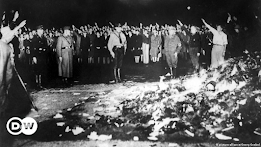 |
| Lady Justice at the Supreme Court |
Congress shall make no law respecting an establishment of religion, or prohibiting the free exercise thereof; or abridging the freedom of speech, or of the press; or the right of the people peaceably to assemble, and to petition the Government for a redress of grievances.
American Civil Liberties Union national president Nadine Strossen notes in her article, there has long been a dichotomy in public opinion about free speech. Surveys traditionally show that the American people have strong support for free speech in general, but that number decreases when the poll focuses on particular forms of controversial speech.
That is where the metaphorical rubber meets the road, folks.
[Note to my gentle readers: For the purposes of today's episode, I am using Cornell University's Legal Information Institute (heretofore CULIL) page on the First Amendment for basic legal definitions. ]
How does one decide what is controversial and possibly unprotected speech versus freedom of speech as protected in the First Amendment? Over the last couple o'hundred years, SCOTUS has heard lots of freedom of expression cases. But it's safe to say that over time, there has been a standard set for what cases can go up the food chain.
One also has to be aware that while community standards do evolve over time, the courts must also weigh those changes in considering which cases will be heard. The best example I can present is in the idea of obscenity. What was shocking in 1822 was clearly different by 1922...just look at women's hemlines....versus what is shocking in 2022. There is no way to uphold a century old standard! But the courts are faced with that consideration:
Currently, obscenity is evaluated by federal and state courts alike using a tripartite standard established by Miller v. California. The Miller test for obscenity includes the following criteria: (1) whether ‘the average person, applying contemporary community standards’ would find that the work, ‘taken as a whole,’ appeals to ‘prurient interest’ (2) whether the work depicts or describes, in a patently offensive way, sexual conduct specifically defined by the applicable state law, and (3) whether the work, ‘taken as a whole,’ lacks serious literary, artistic, political, or scientific value. (CULIL)
That contemporary community standard has changed exponentially with the advent of the internet and instant news. Surely that which is an acceptable community standard in New York or LA might not be acceptable in Des Moines or Jackson. Does the court have to take into account regional proclivities? Yes and no; they have to be "culturally" aware and understand the circumstances in which the potential violation occurs. Which means that the standard, whatever it is, is actually rather fluid.
The CULIL states:
The Supreme Court requires the government to provide substantial justification for the interference with the right of free speech where it attempts to regulate the content of the speech. Generally, a person cannot be held liable, either criminally or civilly for anything written or spoken about a person or topic, so long as it is truthful or based on an honest opinion and such statements. A less stringent test is applied for content-neutral legislation.
The Supreme Court has also recognized that the government may prohibit some speech that may cause a breach of the peace or cause violence. For more on unprotected and less protected categories of speech see advocacy of illegal action, fighting words, commercial speech and obscenity. The right to free speech includes other mediums of expression that communicate a message. The level of protection speech receives also depends on the forum in which it takes place.
So where does hate speech fall, or, more importantly, what constitutes hate speech?
In their position paper on Freedom of Speech, the ACLU points out
If we do not come to the defense of the free speech rights of the most unpopular among us, even if their views are antithetical to the very freedom the First Amendment stands for, then no one's liberty will be secure. In that sense, all First Amendment rights are "indivisible."
Censoring so-called hate speech also runs counter to the long-term interests of the most frequent victims of hate: racial, ethnic, religious and sexual minorities. We should not give the government the power to decide which opinions are hateful, for history has taught us that government is more apt to use this power to prosecute minorities than to protect them. As one federal judge has put it, tolerating hateful speech is "the best protection we have against any Nazi-type regime in this country."
- 1 Incitement. 1.1 Incitement to suicide.
- 2 False statements of fact.
- 3 Counterfeit currency.
- 4 Obscenity.
- 5 Child pornography.
- 6 Fighting words.
- There are two other categories that are not protected:
- Speech Threatening the President
- Speech owned by others



No comments:
Post a Comment